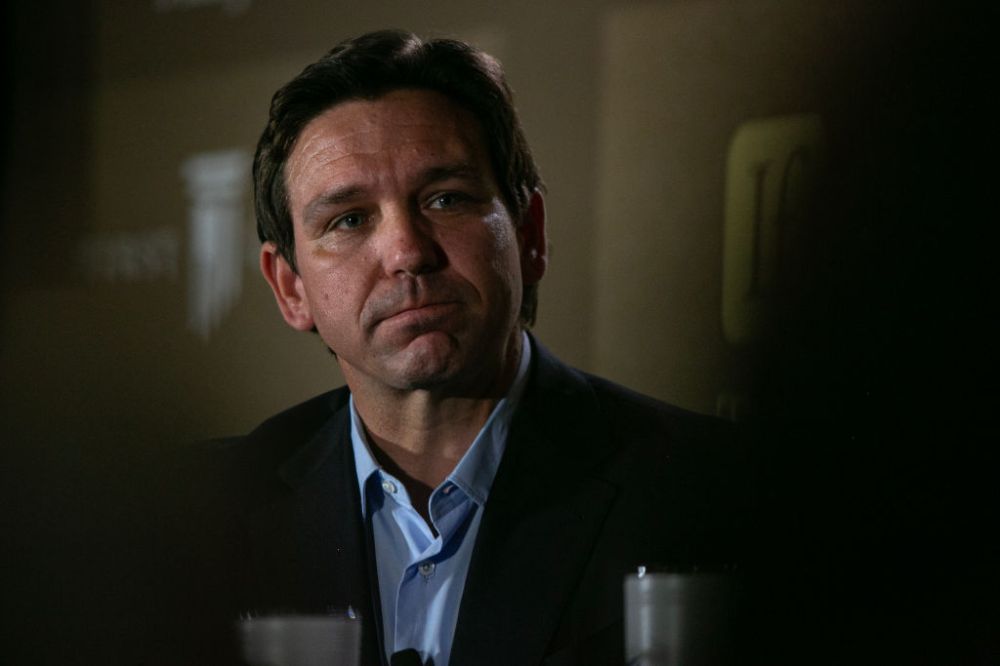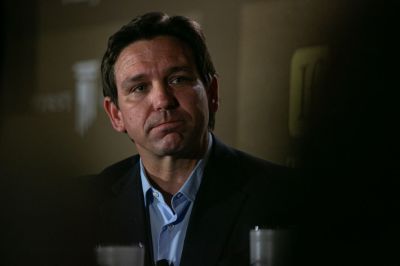When was the last time a candidate badly underperformed expectations in his first campaign for president, then went on to win the White House later?
Trump won the first time he ran. (Seriously ran, that is. His 2000 Reform Party stunt candidacy doesn’t count.) Ditto Barack Obama. Ditto George W. Bush. Ditto Bill Clinton.
The last president who failed in his first try was Bush the elder, but not every failure is due to poor performance. Ronald Reagan was the favorite in 1980 and Bush managed to beat him in Iowa en route to earning a spot on the national ticket. It’s hard to call winning the vice presidency a disappointment.
Reagan also failed in his first run for president, but that can’t fairly be described as underperformance, either. He faced an incumbent in Gerald Ford in 1976 and nearly pulled an historic upset. If anything, he beat expectations.
The only bona fide first-time disappointment to end up as president recently is the current guy, who was regarded as a serious contender in the 1988 cycle before plagiarizing his way into irrelevance. So take heart, Ron DeSantis fans: There is hope for a newbie candidate who underwhelms in his first grab at the brass ring.
All it took for Joe Biden to regain national viability was 32 years, another failed run for president in 2008, two terms as vice president, and an image makeover across decades that turned a brash young loudmouth in the Senate into a kindly enfeebled grandpa. Even then, he barely overcame an opponent in 2020 whose portrait might as well accompany the term “dark triad” in psychology textbooks.
DeSantis 2056 is a live possibility. What about DeSantis 2028?
Candidates who flame out in their first runs for president do often bounce back to win their party’s nomination in their next try. Mitt Romney did it in 2012. So did Hillary Clinton in 2016. Their first campaigns gave voters a look at their agendas, expanded their donor networks, and helped them build relationships within the party which they would leverage later to give them a leg up in their second campaigns.
DeSantis finds himself in that position now. Insofar as any “next in line” dynamic remains in presidential party politics after 15 years of Obama and Trump, the governor of Florida will have the strongest case in 2028 that he’s next in line to be the Republican nominee. He’s probably the second-most widely known figure in the GOP at this point, and he has the distinction of having led all other candidates in the current primary—save one—since the start of national polling last summer.
But check back in a week or two, as that might not last much longer.
Assume that the current numbers bear out and Trump wraps up the race early with victories in Iowa, New Hampshire, and South Carolina. Does the 2028 campaign begin with Ron DeSantis as the favorite?
I’m skeptical. And not just because Trump might be running in that cycle as well.
“It’s too soon to talk about 2028,” you might be thinking.
Is it? The latest Harvard-Harris poll has Trump at 67 percent nationally and DeSantis and Nikki Haley tied for second place at 9 apiece. How much suspense do you suppose is realistically left in this primary?
It’s certainly not too soon to talk about Ron DeSantis’ future. He trails Haley in polling of New Hampshire and South Carolina, and he is perilously close to falling behind her in Iowa despite having been endorsed a few weeks ago by Gov. Kim Reynolds. Two recent surveys of the state, including one conducted after the endorsement, have Haley inching up into a tie with him.
To this point, DeSantis 2024 has resembled a patient following a terrible accident who’s barely breathing on his own. If Haley overtakes him in polls of all three early states, he’ll be placed on life support. I’m not sure he makes it to caucus day in Iowa in that case.
That’s one reason to start thinking about 2028. This is another.
Steven Cheung is Trump’s spokesman. You may remember him from the recent “vermin” episode, when he vowed that the “entire existence” of Trump-hating journalists will be “crushed” if his boss returns to office. Now here he is promising to ruin Ron DeSantis’ presidential ambitions not just in this cycle but in the next one as well.
Maybe it means nothing. Vindictive bravado is the default setting on which all Trump cronies operate, the ocean in which the entire MAGA movement swims. Cheung’s tweet isn’t necessarily evidence of a nascent vendetta, it’s just how Trumpist gremlins talk. Besides, even when Trump and his gremlins do follow through on a vendetta, they’re surprisingly willing to forgive remorseful outcasts and welcome them back into the cult. Steve Bannon went from being derided as “Sloppy Steve” in presidential tweets to receiving a presidential pardon a few years later.
Cheung might be blowing smoke. But consider this: Arguably no one in American politics has been as “disloyal” to Donald Trump as Ron DeSantis.
Was Ted Cruz “disloyal” in 2016 when he fought Trump tooth and nail for the Republican nomination? Not really. Trump wasn’t the leader of the party then. If anything, he was the usurper in the race while Cruz was the brand-name conservative. And Cruz owed Trump nothing politically. When he got elected to the Senate in 2012, the future president was still a private citizen pretending to search for Barack Obama’s birth certificate.
Is Nikki Haley being “disloyal” by fighting Trump for the nomination now? Sure, sort of. She served in his administration, after all. But Haley was also a known quantity in the Republican Party long before Trump took a serious interest in politics, having won two gubernatorial elections before he came down that escalator in 2015. And Haley comes from a different faction of right-wing politics than Trump does. Her challenging him feels less like a usurpation than a test of strength between conservatism and populism.
It was easy for Trumpworld to forgive Cruz in 2016 after he (belatedly) endorsed Trump. I think it’ll be similarly easy for them to forgive Haley when she does the same.
DeSantis will be harder to forgive.
He’s the only person in the party to have semi-seriously threatened Trump’s dominance of it in the past seven years, surging to 30 percent in the national polling average this past winter. Unlike Cruz and Haley, he really does owe his national stature to his rival to a meaningful degree: If not for Trump’s endorsement in the 2018 Florida gubernatorial primary, DeSantis would probably be a lobbyist right now. And he isn’t coming at Trump as a member of a rival right-wing faction, a la Haley. He’s claiming to be more populist than the populist-in-chief himself.
Few Republican politicians are as indebted to Trump as the governor of Florida, and not one has repaid that debt by challenging him for control of the GOP. An authoritarian movement obsessed with “loyalty” will very plausibly bear Ron DeSantis a special, lasting grudge.
The only person I can think of whose disloyalty offended Trump to a similar degree is Jeff Sessions (Mike Pence didn’t quite reach full-fledged “enemy” status until recently, weirdly), and Sessions is a poor analog for DeSantis. He attained high office on his own, almost 20 years before Trump entered politics; it was his endorsement of Trump—not vice versa—that proved influential in a major race; and as furious as Trump was when Sessions recused himself from the Mueller investigation, at least Sessions wasn’t so impertinent as to have tried to snatch the crown from off his head.
Of the two, in other words, DeSantis appears to be guilty of the greater “disloyalty.” Given how Trump held a grudge against Sessions long after he’d resigned as attorney general, going so far as to ruin his bid for a Senate comeback in 2020, why shouldn’t we expect him to do the same the next time the governor runs for president?
And if he does, how viable is DeSantis in 2028, really?
Let’s rephrase that question. Which scenario would make Ron DeSantis winning the Republican nomination in 2028 most likely: That Trump wins the presidency next year, that Trump loses the presidency next year, or that he heads off to the big Bedminster in the sky sometime before the next primary?
If Trump gets reelected, I think DeSantis’ odds of becoming the heir apparent drop to zero. There’d be no reason for Trump to prefer him as a successor to, say, J.D. Vance or Kari Lake in the next primary. No matter how obsequious DeSantis becomes toward Trump in order to atone, he’ll always be the guy who spent the better part of a year on the campaign trail questioning his mental competence, blaming him for America’s pandemic failures, and broadly accusing him of having been all hat and no cattle in keeping the populist promises he made in 2016. His disloyalty will haunt him forever; future primary opponents will make sure of it even if Trump doesn’t.
But Trump will. It’s inconceivable that he would reward DeSantis for mounting the current campaign by endorsing him next time over contenders whose “loyalty” has never been in doubt. He rules by fear. Instinctively, he’ll want to make an example of the governor to show other critics that when you come for the king and miss, you don’t get to become king afterward.
There’s another problem. A second Trump term is shaping up to be so insanely authoritarian that DeSantis’ brand as “Trump but more polished” will suffer by comparison. By 2028, the new party standard for “owning the libs” won’t be passing dubious laws targeting “woke” curricula that end up being immediately enjoined in court. It’ll be stacking law enforcement departments with proto-fascists who’ll do the chief executive’s bidding unquestioningly, whether judges approve or not.
Lots of ambitious young Republican governors will follow Trump’s lead on that, defending his abuses of power and normalizing the aggressive flouting of statutes and court rulings. DeSantis will too in order to keep pace, no doubt, but increasingly he’ll be just one face in a crowd of post-liberal rising stars—and unlike the rest, he’ll have already failed dismally in running for president. Why would Republican voters rally around a demagogue who’s earned a reputation for being uncharismatic and underperforming instead of some exciting newcomer with more presence on the trail?
Worst of all, DeSantis won’t be able to assemble the “hybrid” coalition in 2028 that he had hoped to build this cycle. His promise as a contender this year lay in being populist enough for MAGA populists yet conservative enough for National Review conservatives; only he, I thought, could build a base with enough members of both factions to threaten Trump for the nomination. The lunacy of Trump’s second term will either chase those conservatives out of the party once and for all or convert them at last into earnest post-liberals.
There won’t be any “hybrid” potential next time. Only authoritarians will be left. I don’t see why they’d settle for an opportunist like Ron DeSantis who hedges his ideological bets when they could have Tucker Carlson or J.D. Vance or some similarly earnest proponent of the cause—especially after Trump’s victory in 2024 proves that gonzo revanchist post-liberalism can win in America.
Things would be easier for DeSantis in 2028 if Trump were to lose next year. But not much.
If Trump loses, the governor will be able to say “I told you so.” Republican voters might finally—finally—take that to heart by making youth and electability top priorities in the 2028 primary campaign.
“I told you so” would be a risky message under the circumstances, though. Trump will get right to work after his defeat on brainwashing the right into thinking that 2024 was another rigged election. DeSantis will need to decide how bold he wants to be in contradicting that message, knowing how true believers will hold it against him in the next presidential cycle.
Trump’s status as a two-time loser probably won’t meaningfully diminish his influence within the party either. (You’re not really a loser if both of your “losses” were rigged, right?) Assuming he remains the GOP’s leader, he’ll enjoy enormous influence over whom the party nominates in 2028 if he opts not to run again. The surest way for DeSantis to squander what little chance he has of earning Trump’s endorsement is to cite the defeat of 2024 as proof that Trump is a loser.
Even if Republican voters grudgingly agree with DeSantis that the party needs a new direction in the next cycle, it’s an open question whether DeSantis himself would be deemed “new” enough. Haley, not him, is the Republican who’s crushing Biden head-to-head in recent polling. A party that made electability its highest criterion in 2028 might skip right past DeSantis and land on a somewhat more traditional conservative.
Whether Trump wins or loses, things will get harder for the governor in Florida. His imperviousness and lack of personal charm have made him many enemies back home. He too ruled by fear for the past few years, knowing that no one wants to risk crossing a future president; now that his White House future is hanging by a thread, those enemies are sharpening their knives. It’s unclear how much he’ll be able to get done in the last few years of his term, and it’s also unclear how much of what he’s already gotten done will stick, as court challenges are pending against many of his most notable culture-war initiatives. If they go down in flames, he’ll be known as the guy who “fights” but doesn’t actually win—ironically, the very criticism he’s leveled at Trump of late.
And by early 2027 he’ll be out of office altogether, with no path to another prominent position like senator unless he undertakes to primary Marco Rubio. He’ll lose his ability to do anything legislatively to impress right-wingers right around the time they start paying attention to the presidential contest in the next cycle. Some other governor (Gov. Ramaswamy of Ohio, maybe?) will be the one moving an aggressive agenda to try to dazzle populists looking for a “fighter” to champion them.
Which leaves us with the third scenario.
A sudden vacancy at the top of the GOP, ideally in the next few years when he’s still governor and can work his will on policy, is DeSantis’ best chance to reposition himself as heir apparent to Trump.
In the chaos after Trump’s eventual death, Republican voters will initially be uncertain about how to fill the power vacuum. The governor would be a natural candidate to fill it—well-known, Trumpy, and newly blessed with an excuse to praise Trump and his legacy lavishly. That might soften some of the hard feelings Trumpworld and its disciples bear toward him.
More importantly, with Trump gone, there’d be no one left to impose a litmus test on populist voters requiring them to punish Ron DeSantis for the disloyalty he showed in 2023 the next time he runs for president. Some would-be successors might try. One can imagine Donald Trump Jr. presuming to declare DeSantis persona non grata in the GOP, if only to eliminate a threat to his own future political ambitions. But whether Junior or anyone else in Donald Trump’s inner circle will wield anything approaching his influence after he’s gone is questionable. I doubt it, frankly.
The problem for DeSantis in a Trump-less universe would be this: Has the damage to his reputation already been done?
Cheung’s belittling reference to “Tiny D” is along the same lines. The insults, the nicknames, the jabs about height and boots, etc., are all signals from Trump to his devotees that the governor of Florida isn’t to be taken seriously as a leader. Passing anti-woke state laws is fine and all, but real leadership requires dominance. And a figure worthy of ridicule cannot dominate.
In an authoritarian party with a fetish for “strength,” I don’t know that any politician can overcome the impression that he can’t dominate. The question is whether that impression has been made widely and deeply enough in this campaign among the populist voters whom DeSantis would target in 2028 that they’re now convinced he lacks the charisma or (literal) stature to command the party effectively post-Trump.
That question will dog him even when you-know-who isn’t around anymore. He won’t be The Apprentice in the next cycle, I suspect.







Please note that we at The Dispatch hold ourselves, our work, and our commenters to a higher standard than other places on the internet. We welcome comments that foster genuine debate or discussion—including comments critical of us or our work—but responses that include ad hominem attacks on fellow Dispatch members or are intended to stoke fear and anger may be moderated.
With your membership, you only have the ability to comment on The Morning Dispatch articles. Consider upgrading to join the conversation everywhere.